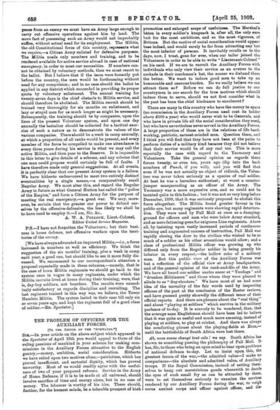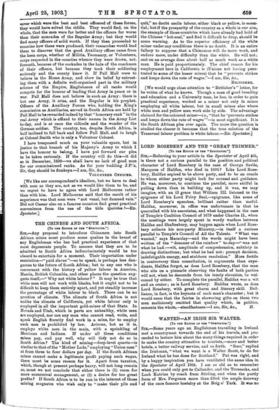THE PROBLEM OF OFFICERS FOR THE AUXILIARY FORCES.
To THE EDITOR Ow THE -spiv:mires:1 Sin,—In your article on the above subject which appeared in the Spectator of April 18th you would appeal to three of the ruling passions of mankind in your scheme for making com- missions in the Auxiliary Forces attractive to the English gentry,—money, ambition, social consideration. Hitherto we have relied upon two motives alone,—patriotism, which has proved insufficient, and sartorial dignity, which has proved unworthy. Most of us would readily agree with the useful- ness of two of your proposed reforms. Service in the Army of Home Defence, if it is to be made at all universal, should involve sacrifice of time and energy alone, but in no case of money. The labourer is worthy of his hire. There should, further, for the keenest minds, be a tolerable prospect of high promotion and enlarged scope of usefulness. The Marshal's bkton in every soldier's knapsack is, after all, the only sure bait for the most ambitions, and so the most vigorous, of Britons. But the motive of social consideration would appear base indeed, and would surely be far from attracting any but the most inferior of persons. It inevitably recalls us to the days, now, I trust, gone for ever, when our tailor• joined the Volunteers in order to be able to write " Lieutenant-Colonel " on his card. If we are to recruit the Auxiliary Forces with individuals who only view their service as an avenue to the cockade in their coachman's hat, the sooner we disband them the better. We want to induce good men to take up an honourable and onerous burden. Do we really believe we can attract them so P Before we can do full justice to our countrymen in our search for the true motives which should induce them to serve, should we not first consider what in the past has been the chief hindrance to enrolment ?
There are many in this country who have the money to spare (no commission in the Auxiliary Forces need cost its holder above £100 a year) who would never wish to be Generals, and who have in private life all the social consideration they need, but who have nevertheless never served in the Auxiliary Forces. A large proportion of these are in the relations of life hard- working, patriotic, earnest-minded men. Question them, and I think you will find that they have not been at the pains to perform duties of a military kind because they did not believe that their service would be of any real use. This is more especially the case with regard to the Yeomanry and Volunteers. Take the general opinion as regards these forces twenty, or even ten, years ago (dip into the back numbers of Punch, if you will), and you will find that even if he was not actually an object of ridicule, the Volun- teer was never taken seriously as a species of real soldier•. At best he was a harmless enthusiast; at worst a counter- jumper masquerading as an officer of the Army. The Yeomanry was a more expensive arm, and so could not be taunted quite in this fashion ; but it was not so very long before December, 1899, that it was seriously proposed to abolish this force altogether. The Militia found greater favour in the public eye, but many regiments were showing rapid deteriora- tion. They were used by Pall Mall at once as a dumping- gr•ound for officers and men who were below Army standard, and as mere fattening-pens for exiguous Line regiments. Above all, by insisting upon vastly increased periods of continuous training and augmented courses of instruction, Pall Mall was rapidly closing the door to the civilian who wished to be as much of a soldier as his other avocations would allow; and a class of professional Militia officer was growing up who differed only from the Regular soldier• in being greatly his inferior in every respect,—the hollow echo of a military man. But this public view of the Auxiliary Forces was but a reflection of the official view at Army headquarters, and of the general opinion of the rank-and-file of the Army. We have all heard our• soldier• uncles sneer at " Yeodogs " and "drunken Militiamen" and those whom they were pleased to allude to as " dog-shooters." We have most of us had some idea of the unreality of the fair• words used by inspecting officers of the past at the conclusion of the Easter reviews, and have guessed pretty shrewdly the different tenor of their official reports. And there are phrases about the "real thing" and about "playing at soldiers" which survive in the military parlance of to-day. It is scarcely to be wondered, then, that the average sane Englishman should have been led to believe that it was quite as useful and much more amusing, instead of playing at soldiers, to play at cricket. And there was always the comforting phrase about the playing-fields at Eton,— until the battlefields of South Africa were lost there.
Ah, nous avons changis tout cela ! we say. South Africa has shown us something passing the philosophy of Pall MalL It has, Sir, to those who bring an open mind to bear upon problems of national defence to-day. Let us insist upon this, the greatest lesson of the war,—the admitted value—I make no comparisons—the absolute and admitted value, of Auxiliary troops. If the Royal Commission, instead of setting them- selves to hang out meretricious gauds wherewith to dazzle the eyes of such small fry as can be attracted by them, were to set themselves seriously to examine the services rendered by our Auxiliary Forces during the war, to weigh corns against corps and officer against officer, and due cover which were the beat and best officered of these forces, they would have solved the riddle. They would find, on the whole, that the men were far better and the officers far worse than their comrades of the Regular Army ; but they would find many officers of solid worth. If they then proceeded to examine how these were produced, their researches would lead them to discover that the good Auxiliary officer came from the keen corps, whether of Militia, Yeomanry, or Volunteers, corps respected in the counties whence they were drawn, not, forsooth, because of the cockades in the hats of the coachmen of their officers, but because they took their soldiering seriously and the county knew it. If Pall Mall were to believe in the Home Army, and show its belief by entrust- ing them with a definite well-organised part in the military scheme of the Empire, Englishmen of all ranks would compete for the honour of leading that Army in peace or in war. Pall Mall does not believe in such an Army : there is but one Army, it cries, and the Regular is his prophet. Officers of the Auxiliary Forces who, holding the King's commission as Auxiliaries, served in South Africa are held by Pall Mall to be rewarded indeed by that " honorary rank " in the real Army which is affixed to their names in the Army List to-day, and is at once the ridicule and the wonder of the German soldier. The country, too, despite South Africa, is half inclined to fall back and follow Pall Mall, and to laugh at Colonel Smith who is only a Volunteer Colonel.
I have trespassed much on your valuable space, but in justice to that branch of his Majesty's Army to which I have the honour to belong, I have put forward our plea to be taken seriously. If the country will do this—it did so in December, 1899—we shall have no lack of good men for our commissioned ranks. As for your budding J.P.'s, Sir, they should be flunkeys.—I am, Sir, &c.,
VOLUNTEER OFFICER.
[We like our correspondent's idealism, but we have to deal with men as they are, not as we would like them to be, and we regret to have to agree with Lord Melbourne rather than with him. Lord Melbourne said that the result of his experience was that men were " not venal, but damned vain." Did not Caesar also on a famous occasion find great practical convenience from the use of the title Quiritea ?—ED. Spectator.]



























































 Previous page
Previous page